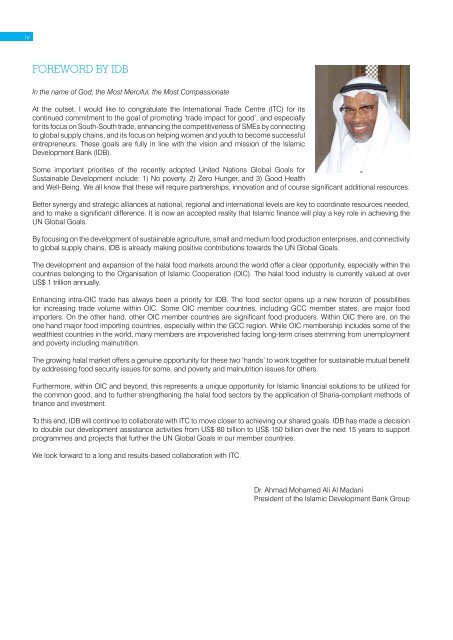Halal Goes Global
Halal_Goes_Global-web(1)
Halal_Goes_Global-web(1)
You also want an ePaper? Increase the reach of your titles
YUMPU automatically turns print PDFs into web optimized ePapers that Google loves.
iv<br />
FOREWORD BY IDB<br />
In the name of God, the Most Merciful, the Most Compassionate<br />
At the outset, I would like to congratulate the International Trade Centre (ITC) for its<br />
continued commitment to the goal of promoting ‘trade impact for good’, and especially<br />
for its focus on South-South trade, enhancing the competitiveness of SMEs by connecting<br />
to global supply chains, and its focus on helping women and youth to become successful<br />
entrepreneurs. These goals are fully in line with the vision and mission of the Islamic<br />
Development Bank (IDB).<br />
Some important priorities of the recently adopted United Nations <strong>Global</strong> Goals for<br />
Sustainable Development include: 1) No poverty, 2) Zero Hunger, and 3) Good Health<br />
and Well-Being. We all know that these will require partnerships, innovation and of course significant additional resources.<br />
Better synergy and strategic alliances at national, regional and international levels are key to coordinate resources needed,<br />
and to make a significant difference. It is now an accepted reality that Islamic finance will play a key role in achieving the<br />
UN <strong>Global</strong> Goals.<br />
By focusing on the development of sustainable agriculture, small and medium food production enterprises, and connectivity<br />
to global supply chains, IDB is already making positive contributions towards the UN <strong>Global</strong> Goals.<br />
The development and expansion of the halal food markets around the world offer a clear opportunity, especially within the<br />
countries belonging to the Organisation of Islamic Cooperation (OIC). The halal food industry is currently valued at over<br />
US$ 1 trillion annually.<br />
Enhancing intra-OIC trade has always been a priority for IDB. The food sector opens up a new horizon of possibilities<br />
for increasing trade volume within OIC. Some OIC member countries, including GCC member states, are major food<br />
importers. On the other hand, other OIC member countries are significant food producers. Within OIC there are, on the<br />
one hand major food importing countries, especially within the GCC region. While OIC membership includes some of the<br />
wealthiest countries in the world, many members are impoverished facing long-term crises stemming from unemployment<br />
and poverty including malnutrition.<br />
The growing halal market offers a genuine opportunity for these two ‘hands’ to work together for sustainable mutual benefit<br />
by addressing food security issues for some, and poverty and malnutrition issues for others.<br />
Furthermore, within OIC and beyond, this represents a unique opportunity for Islamic financial solutions to be utilized for<br />
the common good, and to further strengthening the halal food sectors by the application of Sharia-compliant methods of<br />
finance and investment.<br />
To this end, IDB will continue to collaborate with ITC to move closer to achieving our shared goals. IDB has made a decision<br />
to double our development assistance activities from US$ 80 billion to US$ 150 billion over the next 15 years to support<br />
programmes and projects that further the UN <strong>Global</strong> Goals in our member countries.<br />
We look forward to a long and results-based collaboration with ITC.<br />
Dr. Ahmad Mohamed Ali Al Madani<br />
President of the Islamic Development Bank Group


